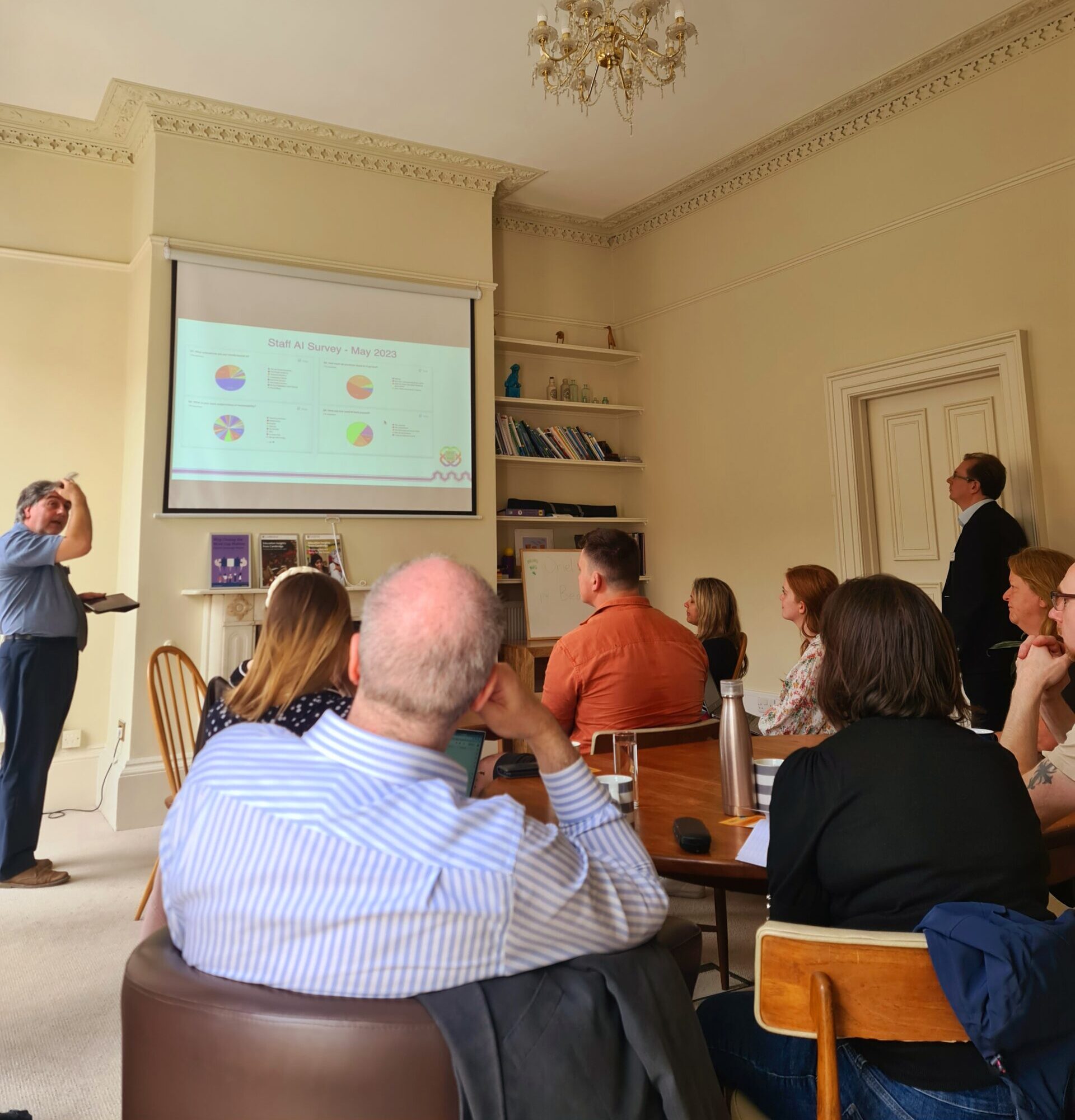AI for teachers: Demystifying AI in schools
On the 12th July, Oriel Square hosted a roundtable event to explore the uses of AI and share practical tips for teachers. We were joined by Greg Hughes, teaching leader, Apple Distinguished Educator, and global speaker on EdTech/STEM, and 10 teachers, headteachers and senior leaders from eight schools representing MAT, Local Authority, Independent, Primary, Secondary, Grammar school and IB sectors.
Greg Hughes is Director of ICT at The de Ferrers Trust and Vice Principal: Digital Strategy at The de Ferrers Academy. Greg has advocated for harnessing ICT since 1990, champions the integration of mobile technology in education, and contributes to the EdTech UK advisory group. Follow him on Twitter @deepexperience1.
Get the AI for teachers delegate pack.
A Trust-wide AI strategy
‘Early majority’ adopters are the key group for technology success in schools – almost 70% of staff fall into this group. Finding messages and approaches that resonate with this majority, and differentiating your aims keeps people on board. You can support ‘Laggards’, but don’t waste energy – give them reasons to catch up instead.
Five key areas for developing a successful AI strategy
As only 1% of schools have an AI policy, five areas were discussed as key to a successful AI strategy:
- Cybersecurity
- Assessment and ethics
- Student use and curriculum
- Staff use and CPD
- Vision and planning
An example Statement of Intent discussed the benefits of AI in supporting planning and Assessment For Learning, reducing workload, generating content and supporting research. It identified the need to introduce AI use in two key areas: within the curriculum for students, and to highlight best practice in staff CPD.
However, it was acknowledged that AI comes with risks, so policies and guidelines must set out clear expectations and outline risks of possible biases and inaccuracies. Most importantly, in this rapidly growing area, policies and guidelines must be adaptable.
AI in schools
None of the schools represented had an AI policy in place, but most attendees had experimented with AI at work. Many attendees said they are still new to experimenting with AI tools, and haven’t found the best ways to use it. Interested centred on how it can reduce workload and produce resources, and what subject-specific solutions are available.
The keynote also demonstrated inputting different prompts into generative AI browsers and suggested experimenting to find the best output. Free AI tools such as Clipdrop, Looka, Soundraw and TeacherMateAI were also discussed.
Examples and feedback on using generative AI
Several teachers admitted having poor knowledge about how to prompt AI to generate desired outputs but had some success by iterating their prompts. One Head of Department used it to produce Schemes of Work, but caveated that creating the prompts and revising what the AI produces can take longer than doing the work yourself. Delegates agreed that templating base prompts would be a helpful starting point for teachers starting to experiment with AI.
Conversely, an English teacher said that they would hesitate to use it because it doesn’t produce reliable content; it can mimic a good essay structure, but the concepts don’t make sense. Another teacher experimented with using AI to mark work by inputting the criteria and students’ answers, but it lacked accuracy.
When discussing implications for students’ work, a teacher noted that the increasing use of AI is making teachers shift their students’ learning goals from producing work towards critical analysis.
The following ideas were also discussed:
- Generating retrieval questions
- Assessing learning gaps
- Midway checkpoints
- Schemes for Learning and Medium-Term Plans
- Generating sample answers for critical analysis
- Creating research summaries
- Media generation
Get the AI for teachers delegate pack.
Q&A
Keep reading to find out what teachers want to know.
Do students know how to use AI?
Delegates wanted more training for students to demonstrate using prompts to create specific outputs. They agreed that understanding how AI works would also help students identify the risks.
Delegates also discussed a growing accessibility gap, and how using AI technologies at home might widen this.
How have you navigated AI-hallucinated content?
There was hesitancy around using AI for research because of the risk of fake information. Though it was discussed, this remains unresolved.
Has it changed homework policies?
One teacher was conducting essay writing by hand in class, rather than at home, but acknowledged it wasn’t a permanent solution. Some schools were adapting homework policies, but these varied by subject. Where homework was set, they said, it should test critical evaluation and research rather than writing.
Have you discussed the climate implications of AI?
Many teachers hadn’t thought about climate implications. They agreed more awareness was needed for staff and students.
What are the top things I need to tell my staff about AI?
For whole-school approaches, the priority was producing a policy about how schools use AI, and a publicised Statement of Intent. Aiming for a 1% improvement each day would lead to better results than tackling everything at once.
Where have you received information about AI in school from?
Most delegates had not received guidance on using AI in school, and those with guidance had obtained it through their own research. This included reading other policies, and guidelines from NASUWT, IB Schools, The Key, and Higher Education.
AI in education report
This article features in our inaugural Education Insights report, AI in education. The report brings together the most up to date insights from the classroom and from thought leaders in education. Read our full report here.


